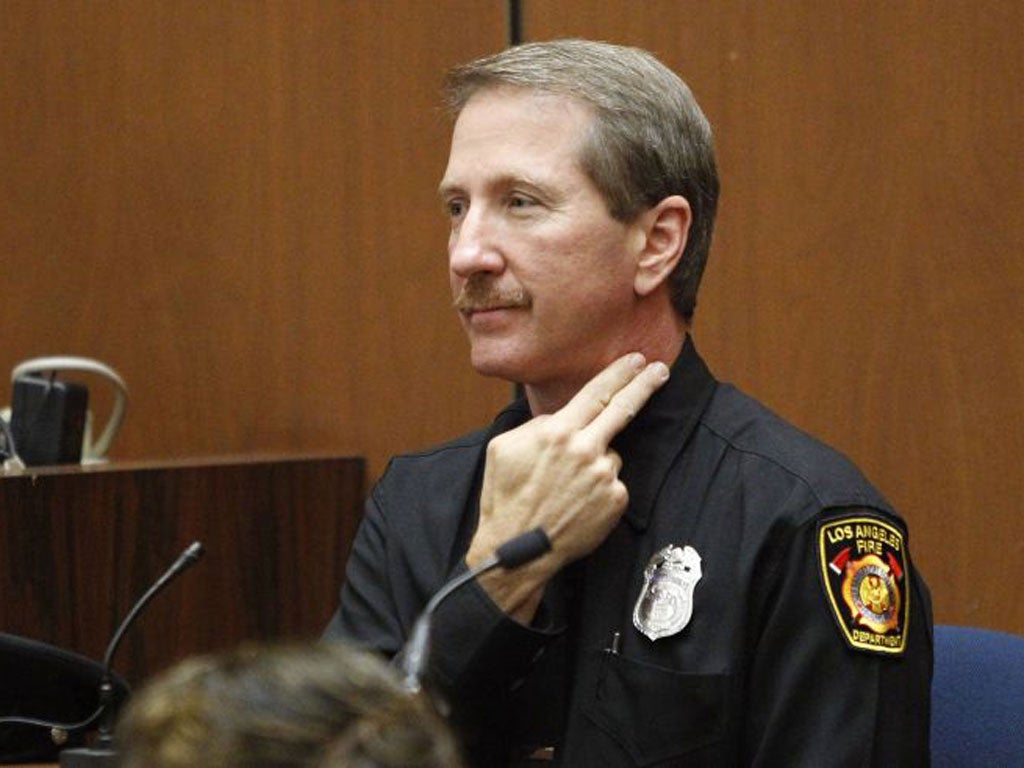Doctor's comments 'didn't add up', says medic in Jackson trial

After just a few moments in Michael Jackson's bedroom, the paramedic sent to save his life told the trial of the doctor accused of killing the singer that he knew things did not add up.
A skinny man was on the floor, eyes open with a surgical cap on his head and his skin turning blue, said Richard Senneff. The paramedic asked the sweating, frantic-looking doctor in the room what condition the stricken man had.
"He said, 'Nothing. He has nothing'," Mr Senneff told jurors at the involuntary manslaughter trial of Jackson's doctor, Conrad Murray.
"Simply, that did not add up to me," Mr Senneff said.
Over the course of the 42 minutes that Los Angeles paramedics tried to revive Jackson, 50, several other things about the room and Murray's responses seemed inconsistent to Senneff.
After repeated prodding, Murray revealed a few details about his actions, saying he had only given Jackson a dose of the sedative lorazepam to help him sleep, Mr Senneff told the Los Angeles court.
In addition, there were bottles of medicine on Jackson's nightstand and Murray finally offered that he was treating the singer for dehydration and exhaustion.
Mr Senneff said Murray never mentioned that he had also been giving Jackson doses of the anaesthetic propofol and other sedatives, a key omission that prosecutors say shows he repeatedly tried to conceal his actions during the struggle to save the pop superstar in June 2009.
Murray, 58, has pleaded not guilty. If convicted, he could face up to four years in prison and lose his medical licence.
Prosecutors say the Houston, Texas-based cardiologist repeatedly lied to medics and emergency room doctors about medication he had been giving Jackson in the singer's bedroom. They claim Murray administered a fatal dose of propofol and other sedatives.
Defence lawyers claim Jackson gave himself the fatal dose after his doctor left the room.
Defence lawyer Nareg Gourjian asked Mr Senneff whether Jackson's appearance was consistent with someone who was a drug addict.
Mr Senneff said that was a difficult determination to make, but he did think the singer "looked like he had a chronic health problem".
Mr Senneff was the first paramedic to reach Jackson's bedroom and said within moments he and three other paramedics were working to revive Jackson. But after trying multiple heart-starting medications and other efforts, Jackson was still lifeless.
"Did you ever see any sign of life in Mr Jackson during the entire time you were attempting to save him," prosecutor Deborah Brazil asked.
"No I did not," Mr Senneff said.
Another paramedic dispatched to the room, Martin Blount, agreed. He told jurors that they thought Jackson was dead soon after they arrived in the room.
Mr Blount also said he saw three open bottles of lidocaine on the floor of the room but noted that Murray never mentioned giving Jackson the painkiller. He told jurors he saw the doctor scoop up the vials and drop them in a black bag.
The seven-man, five-woman jury heard evidence about efforts to revive Jackson, who the paramedics and emergency room doctor thought was dead at his rented mansion. Still, the singer was transported to Ronald Reagan UCLA Medical Centre because Murray wanted life-saving efforts to continue.
After loading Jackson into an ambulance, Mr Senneff said he saw Murray collecting items from Jackson's bedside. The doctor was alone in the bedroom for several moments before joining paramedics in the ambulance for the drive to the hospital, Mr Senneff said.
Mr Gourjian suggested Murray had been collecting his wallet and glasses, but Mr Senneff said he could not see the items.
In the ambulance, Mr Blount said, he heard Murray make a phone call. "'It's about Michael and it doesn't look good'," Mr Blount recalled hearing Murray saying.
Jurors also heard from a former Murray patient who praised the doctor's treatment of him, but said the cardiologist became increasingly distant and hard to reach while working with Jackson.
"I felt like I was getting the best care in the world," said Robert Russell of Las Vegas, before Murray became the singer's personal physician. "The advice he gave me saved my life."
But Mr Russell said he could not get answers about his own treatment, and the man who once spent so much time offering care and advice was unreachable.
He called Murray's office on June 25 2009 - the day Jackson died - and demanded to speak to the doctor.
The doctor returned the call and left him a voicemail at 11.49am. Prosecutors are using records to show that Murray was on the phone in the moments before he realised Jackson was unconscious.
Thirty-seven minutes later Mr Senneff ran into Jackson's bedroom. AP
Join our commenting forum
Join thought-provoking conversations, follow other Independent readers and see their replies
Comments